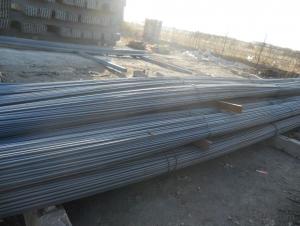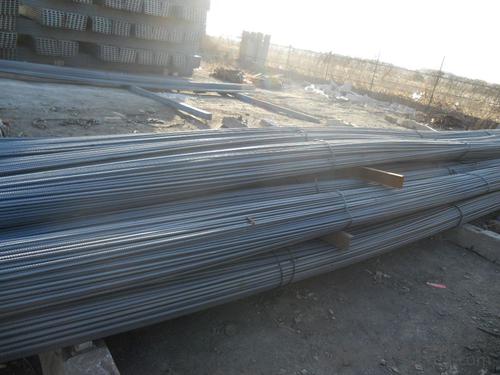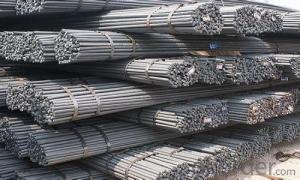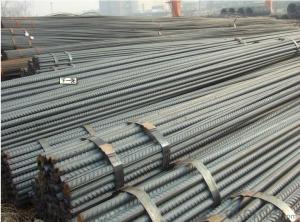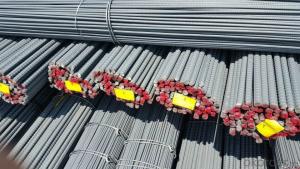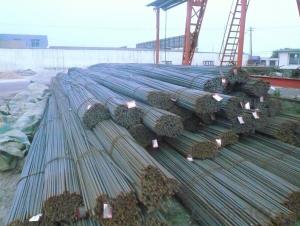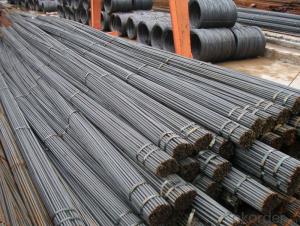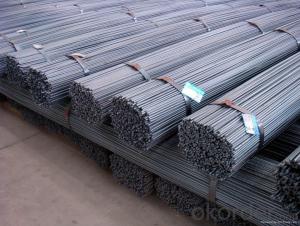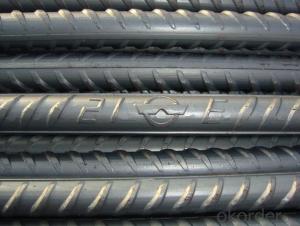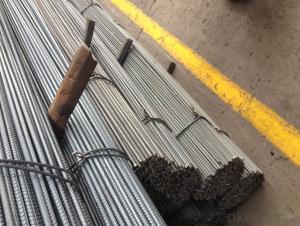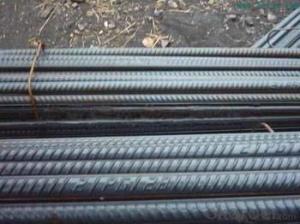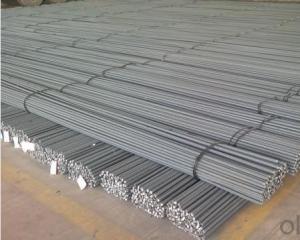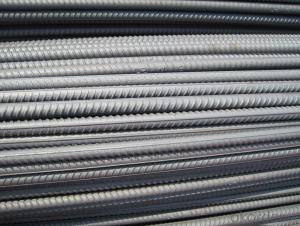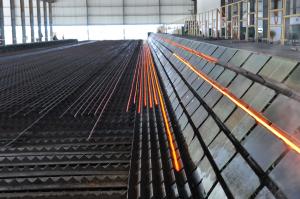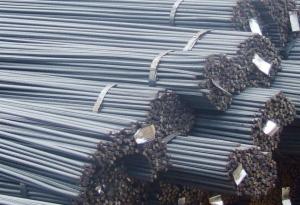GB400 Deformed Steel Bars for construction
- Loading Port:
- Tianjin
- Payment Terms:
- TT or LC
- Min Order Qty:
- 25 m.t.
- Supply Capability:
- 100000 m.t./month
OKorder Service Pledge
OKorder Financial Service
You Might Also Like
Product Description:
OKorder is offering GB400 deformed steel bars for construction at great prices with worldwide shipping. Our supplier is a world-class manufacturer of steel, with our products utilized the world over. OKorder annually supplies products to European, North American and Asian markets. We provide quotations within 24 hours of receiving an inquiry and guarantee competitive prices.
Product Applications:
GB400 deformed steel bars are ideal for structural applications and are widely used in the construction of buildings and bridges, and the manufacturing, petrochemical, and transportation industries.
Product Advantages:
OKorder's deformed steel bars are durable, strong, and resist corrosion.
Main Product Features:
· Premium quality
· Prompt delivery & seaworthy packing (30 days after receiving deposit)
· Corrosion resistance
· Can be recycled and reused
· Mill test certification
· Professional Service
· Competitive pricing
Product Specifications:
Specifications of Deformed Steel Bar:
Standard | GB | HRB335, HRB400, HRB500 | |
UK | G460B, B500A, B500B,B500C | ||
USA | GR40, GR60 | ||
Diameter | 6mm,8mm,10mm,12mm,14mm,16mm,18mm,20mm, 22mm,25mm,28mm,32mm,36mm,40mm,50mm | ||
Length | 6M, 9M,12M or as required | ||
Place of origin | China mainland | ||
Application | building,construction,road,bridge etc | ||
Brand name | DRAGON | ||
Theoretical weight and section area of each diameter as below for your information:
Diameter(mm) | Section area (mm²) | Mass(kg/m) |
6 | 28.27 | 0.222 |
8 | 50.27 | 0.395 |
10 | 78.54 | 0.617 |
12 | 113.1 | 0.888 |
14 | 153.9 | 1.21 |
16 | 201.1 | 1.58 |
18 | 254.5 | 2.00 |
20 | 314.2 | 2.47 |
22 | 380.1 | 2.98 |
25 | 490.9 | 3.85 |
28 | 615.8 | 4.83 |
32 | 804.2 | 6.31 |
36 | 1018 | 7.99 |
40 | 1257 | 9.87 |
50 | 1964 | 15.42 |
Usage and Applications of Deformed Steel Bar:
Deformed bar is widely used in buildings, bridges, roads and other engineering construction. Big to highways, railways, bridges, culverts, tunnels, public facilities such as flood control, dam, small to housing construction, beam, column, wall and the foundation of the plate, deformed bar is an integral structure material. With the development of world economy and the vigorous development of infrastructure construction, real estate, the demand for deformed bar will be larger and larger..
Packaging & Delivery of Deformed Steel Bar:
Packaging Detail: products are packed in bundle and then shipped by container or bulk vessel, deformed bar is usually naked strapping delivery, when storing, please pay attention to moisture proof. The performance of rust will produce adverse effect.
Each bundle weight: 2-3MT, or as required
Payment term: TT or L/C
Delivery Detail: within 45 days after received advanced payment or LC.
Label: to be specified by customer, generally, each bundle has 1-2 labels
Trade terms: FOB, CFR, CIF
Deformed Steel Bar in Coil
Produce Line of Deformed Steel Bar
Note:
1. Our products are produced according to national standard (GB), if not, supply according to national standards (GB) or agreement as customer required.
2. Other Grade and Standard Deformed Steel Bar we can supply:
Grade: GR40/GR60, G460B/B500A/B500B/B500C,BST500S
Standard: ASTM, BS, DIN
The Minimum Order Quantity of these products is high, and need to be confirmed.
3. We can not only supply Deformed Steel Bar; if you need anything about building materials, please contact us for further information.
4. Please send us your detail specifications when inquire. We will reply to you as soon as possible. We sincerely hope we can establish a long stable business relationship
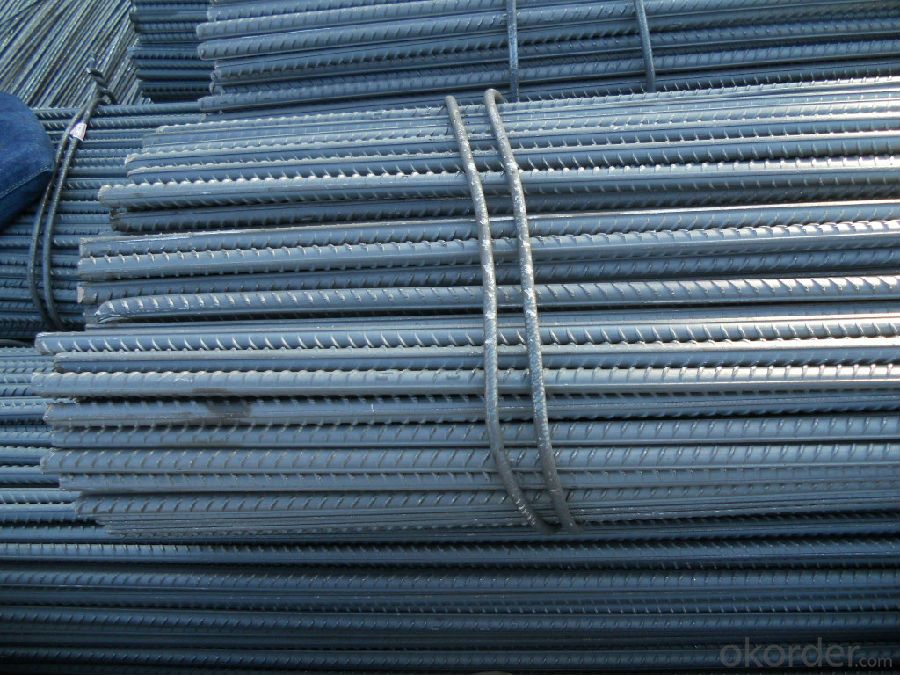
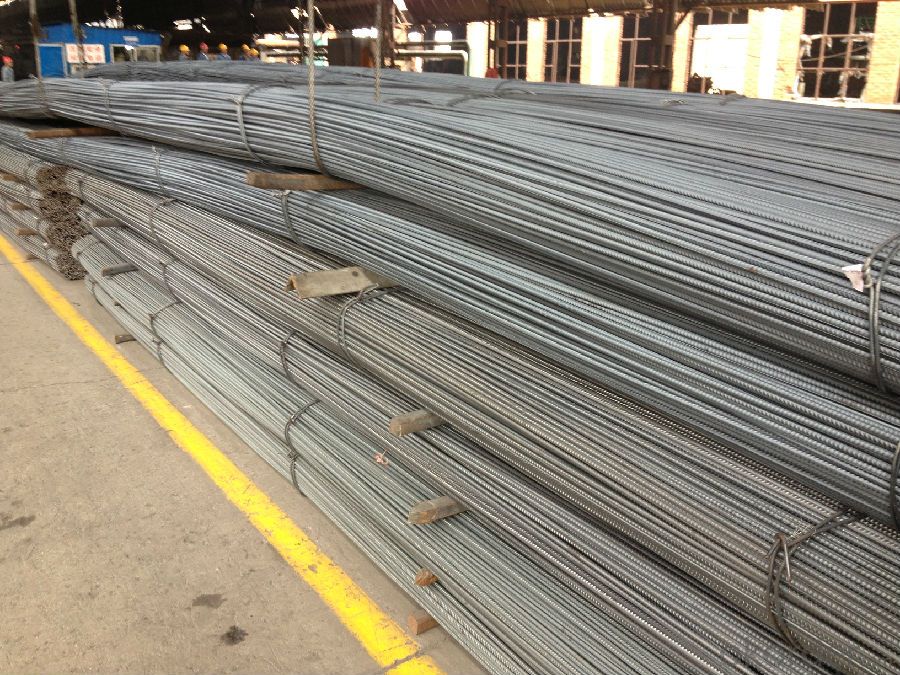
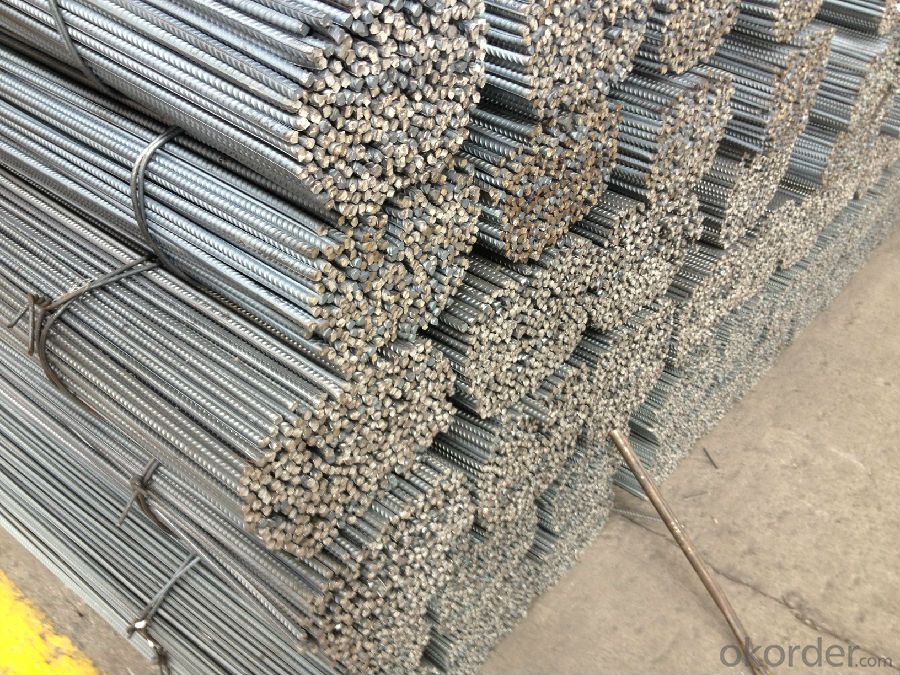
FAQ:
Q1: Why buy Materials & Equipment from OKorder.com?
A1: All products offered byOKorder.com are carefully selected from China's most reliable manufacturing enterprises. Through its ISO certifications, OKorder.com adheres to the highest standards and a commitment to supply chain safety and customer satisfaction.
Q2: How soon can we receive the product after purchase?
A2: Within three days of placing an order, we will begin production. The specific shipping date is dependent upon international and government factors, but is typically 7 to 10 workdays.
- Q: Are there any limitations on the maximum spacing between steel rebars in concrete?
- Yes, there are limitations on the maximum spacing between steel rebars in concrete. The maximum spacing is determined by various factors such as the structural requirements, load-bearing capacity, and durability of the concrete structure. It is essential to adhere to the specified spacing guidelines to ensure the strength and integrity of the concrete reinforcement.
- Q: Can steel rebars be used in structures with curved or irregular shapes?
- Yes, steel rebars can be used in structures with curved or irregular shapes. Steel rebars are highly flexible and can be bent or shaped to fit the desired form of the structure. They are commonly used in reinforced concrete structures, which often require curved or irregular shapes to meet architectural or structural design requirements. The rebars are typically bent or cut to the required shape and then securely anchored in place to provide strength and reinforcement to the structure. This allows for the construction of structures with complex shapes and designs, while still ensuring structural integrity and durability.
- Q: What is the cost of steel rebars?
- The cost of steel rebars can vary depending on various factors such as the grade of steel, market conditions, and location. On average, the cost of steel rebars ranges from $500 to $800 per metric ton. However, it is important to note that prices can fluctuate due to factors like supply and demand, raw material costs, and any additional taxes or tariffs imposed on steel imports. It is recommended to contact local suppliers or check market reports for the most up-to-date and accurate pricing information.
- Q: Are there any disadvantages to using steel rebars?
- Yes, there are some disadvantages to using steel rebars. Firstly, steel rebars can corrode over time, especially in environments with high moisture or exposure to chemicals, which can reduce their strength and durability. Additionally, steel rebars are susceptible to thermal expansion and contraction, leading to cracking in concrete structures. Moreover, steel rebars are heavy and can be challenging to handle and transport, making construction processes more labor-intensive.
- Q: Do steel rebars affect the weight of a structure?
- Yes, steel rebars do affect the weight of a structure. Rebars, also known as reinforcing bars, are steel bars used to reinforce concrete structures. When concrete is poured, rebars are embedded within it to provide additional strength and support. Since steel is much denser than concrete, the addition of rebars increases the overall weight of the structure. However, the weight increase is relatively small compared to the benefits gained in terms of structural integrity and load-bearing capacity. Rebars help distribute the load more evenly throughout the structure, making it more resistant to bending, cracking, and collapsing under heavy loads. Therefore, while rebars do add some weight to a structure, the advantages they bring in terms of safety and longevity far outweigh the slight increase in weight.
- Q: What are the factors that affect the cost of steel rebars?
- There are several factors that affect the cost of steel rebars. These include the price of raw materials such as iron ore and scrap metal, as well as the cost of energy and transportation. Additionally, market demand and supply, currency exchange rates, and government regulations can also impact the cost of steel rebars.
- Q: Are steel rebars suitable for use in high-traffic areas like bridges?
- Yes, steel rebars are suitable for use in high-traffic areas like bridges. Steel rebars provide exceptional strength and durability, making them ideal for withstanding heavy loads and frequent use. Additionally, steel rebars offer excellent resistance to corrosion, ensuring the longevity and structural integrity of bridges in high-traffic areas.
- Q: What are the guidelines for protecting steel rebars during concrete placement and compaction?
- The guidelines for protecting steel rebars during concrete placement and compaction include ensuring that the rebars are clean and free from any rust, grease, or other contaminants. They should be properly tied and supported to maintain their position and prevent displacement during the concrete pouring process. Additionally, rebars should be adequately spaced to allow concrete to flow around them and provide sufficient cover, as specified in the design requirements. Care should be taken to avoid damaging the rebars during compaction, and vibrating equipment should be used cautiously to prevent excessive force or vibration that could cause rebars to shift or become dislodged. Regular inspections should be conducted to check for any damage or movement of the rebars, and necessary repairs or reinforcement should be done promptly to ensure the structural integrity of the concrete.
- Q: How do steel rebars affect the overall strength of concrete structures?
- The overall strength and durability of concrete structures are significantly improved by the presence of steel rebars. These rebars are commonly used to reinforce concrete and enhance its ability to withstand stretching or pulling forces, known as tensile strength. Concrete itself is strong when compressed but weak when subjected to tension. When external forces, like bending or stretching, are applied to concrete, it tends to crack and fail. This is where steel rebars come into play. By adding rebars to the concrete, the structure's tensile strength is greatly enhanced. Rebars act as a robust framework within the concrete, providing resistance against tensile forces. When the concrete is under tension, the rebars bear the load and distribute it evenly, preventing the formation of cracks and improving the overall strength of the structure. This reinforcement also limits the spread of cracks, ensuring the structure remains intact and stable even under heavy loads or adverse conditions. Additionally, steel rebars enhance the structural integrity of concrete structures by increasing their resistance to bending, shearing, and torsional forces. They make the concrete stiffer and more resistant to deformation, thus improving its capacity to carry loads. Apart from strengthening the structure, steel rebars also play a vital role in preventing corrosion. They are made of materials that resist corrosion, such as stainless steel or galvanized steel, protecting the concrete from moisture and other corrosive elements. This ensures the longevity and durability of the concrete structure. To summarize, steel rebars greatly enhance the overall strength and durability of concrete structures by improving their tensile strength, resistance to bending and shearing forces, and preventing corrosion. They provide the necessary reinforcement to enable concrete to withstand external forces, ensuring the safety and longevity of the structure.
- Q: What is the role of steel rebars in minimizing the risk of concrete spalling due to sulfate attack?
- Steel rebars play a crucial role in minimizing the risk of concrete spalling due to sulfate attack by providing reinforcement and increasing the overall strength of the concrete structure. When concrete is exposed to sulfate ions, it can undergo a chemical reaction that leads to expansion and cracking, resulting in spalling. However, steel rebars act as a reinforcement, helping to distribute the stress and load throughout the concrete, reducing the risk of cracking and spalling. Additionally, the presence of rebars helps to maintain the structural integrity of the concrete, preventing the ingress of sulfate ions and minimizing the potential for sulfate attack.
Send your message to us
GB400 Deformed Steel Bars for construction
- Loading Port:
- Tianjin
- Payment Terms:
- TT or LC
- Min Order Qty:
- 25 m.t.
- Supply Capability:
- 100000 m.t./month
OKorder Service Pledge
OKorder Financial Service
Similar products
Hot products
Hot Searches
Related keywords
